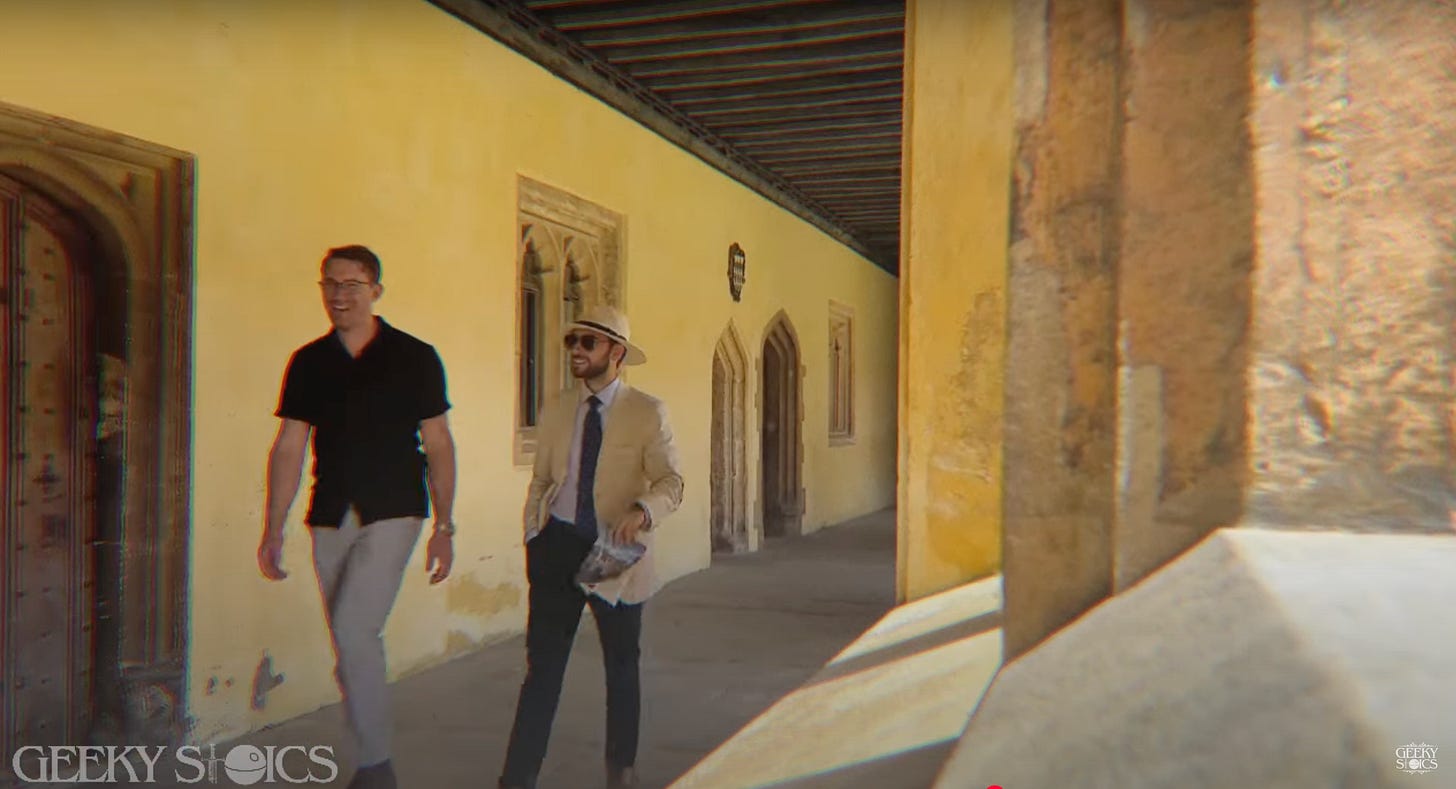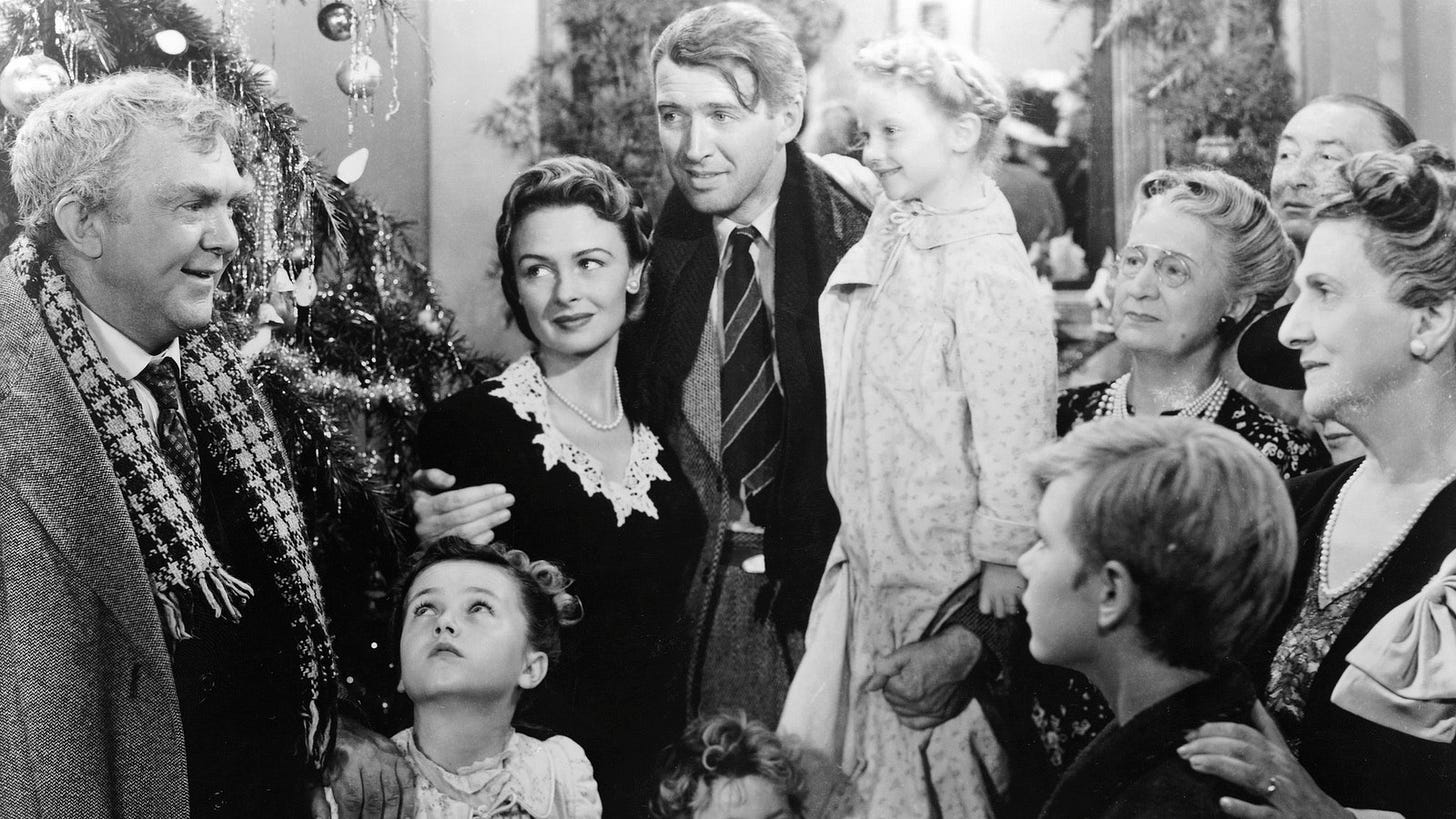Is Friendship dead?
Tolkien and the lost virtue of friendship
Hobbits know it.
The Stoics knew it.
This week’s Geeky Stoics video is all about Fellowship.
Somewhere along the way, we lost it. I bet you’ve felt this personally. Studies have consistently shown a substantial decrease in the number of Americans reporting having close Friends. One study indicated a quadrupling of adults who report having no close friends since 1990. Our social networks online have grown vast, and in the real world, almost non-existent.
We see much less of the deep, loyal friendships like those modeled in The Lord of the Rings and Band of Brothers. Not water cooler buddies, but real friendship rooted in shared purpose. Now you’ll notice I’m using Friendship and Fellowship somewhat interchangeably, knowing they aren’t the same, but more like cousins. You can be in Fellowship with someone you don’t consider a dear friend, but you won’t make any lifelong friends at all, absent fellowship.
Seneca repeatedly wrote that the best friendships are based not on utility or pleasure, but on shared commitment to moral excellence. In Letters to Lucilius (Letter IX), he writes that a true friend is “another self,” bound together by mutual goodwill and the pursuit of virtue.
I’ve been reading Hobbit Virtues by Dr. Christopher Snyder, a book that explores a series of virtues associated with hobbits. As the title suggests, these are qualities embedded in Tolkien’s world that we might aspire to in our own.
Today I’m zeroing in on Fellowship.
On Geeky Stoics, our most popular video so far is about Friendship, specifically, the importance of preserving and recognizing deep, platonic bonds, and the harm caused when people cynically project sexual intention onto otherwise platonic brotherhood. The classic example is Sam and Frodo.
Right now, as a society, I think the very social fabric that facilitates lasting friendship, the kind we saw with Harry-Hermione-Ron, or Sam and Frodo, The Inklings (C.S. Lewis, Tolkien, Charles Williams, and Warnie Lewis), is under attack.
Growing up, I didn’t have many close friends. I moved a lot and never lived anywhere for more than a few years. That made it hard to strike up and maintain friendships of any kind. Don’t get me wrong, superficial friendships are easy for people who share common interests or work with coworkers you see every day, but the deep bond… caring for and supporting people who share your values, is rare.
I feel it’s getting even rarer in the world today, and that feeling is backed up by the research I’ve noted above. You’re not alone in feeling disconnected.
We live in a world where technology is supposed to “connect” us. Remember, Facebook’s slogan was originally about “making the world more connected,” and yet we know it did exactly the opposite.
The concept of deep fellowship can be difficult to define, but we’ve all encountered it in movies, our favorite books, and the characters we connect with.
Look at It’s a Wonderful Life. I watch it every Christmas. The angel Clarence tells George Bailey, “Remember, no man is a failure who has friends.” It’s a beautiful sentiment in a story about a man who didn’t realize his impact on his community.
That sentiment is ancient. The Book of Proverbs speaks of “a friend who sticks closer than a brother.” Jesus himself said in the Gospel of John, “Greater love has no one than this: to lay down one’s life for one’s friends.”
It’s the same ideal found in the “Band of Brothers” concept. If you’ve seen the HBO series, you know it’s about bonds formed in war, which is often man’s strongest common cause. It’s one of the reasons I joined the Air Force. I wanted to find that kind of brotherhood.
But ideals are hard to live up to. The reality of military culture today doesn’t come close to those stories I grew up watching. It’s discouraging. And yet, before we can mourn what’s been lost, we have to understand the ideal.
What kind of lightning is it that we’re trying to bottle?
Tolkien’s View of Fellowship
Tolkien knew the ideal. Fellowship is literally the title of the first book of The Lord of the Rings: The Fellowship of the Ring. One of the most tragic moments in the book is the breaking of that fellowship. It built on the best elements of The Hobbit, namely a group of men on a mission together that would bend and break them, but bring them closer together nevertheless.
Christopher Snyder notes that Tolkien’s view was shaped by his own friendships at school in Birmingham and later as a student and professor at Oxford. He saw fellowship as something beyond individual friendship, rooted in a common cause.
In Plato’s time, philia referred to friendship, while koinonia denoted fellowship, association, and participation. Aristotle used philia to describe friendship based on equality and shared purpose, and he defined koinonia as human relationships with shared functions or interests.
Seneca argued that pursuing friendship is a virtue in itself.
“Let us now return to the question. The wise man, I say, self-sufficient though he be, nevertheless desires friends if only for the purpose of practising friendship.”
-Seneca
From a Christian perspective, the clearest example is the twelve disciples, a fellowship built on a singular shared mission to follow this crazy Jesus guy..
The Inklings
Tolkien lived this through the Inklings, his fellowship of academics and authors, including C.S. Lewis. They gathered at the Eagle & Child Pub (or “The Bird and Baby”) each week, drank beer by the fire, took long country walks, and debated literature.
Stephen recently had the opportunity to visit (Video recap)

These men were walking the walk and talking the talk before writing the books that embodied these principles. That’s why, in The Hobbit, Bilbo begins isolated and comfortable, with no apparent close friends until Gandalf disrupts everything by bringing the dwarves into his home.
Bilbo is reluctant to join the company. But Thorin’s cause to regain his homeland draws him in. He has many chances to leave, yet he stays. Even when he makes the hard choice to give the Arkenstone to Bard, risking his friendship with Thorin, he chooses the good of the larger cause. In the end, Thorin calls Bilbo to his side to part in friendship.
The theme continues in The Fellowship of the Ring. Frodo, Sam, Merry, and Pippin already have a small fellowship before they join the larger one. They shared meals, songs, and country walks just like the Inklings themselves.
The breaking of the Fellowship is heartbreaking. Gandalf falls in Moria. Boromir tries to take the Ring from Frodo. Yet even after Boromir’s death, Aragorn chooses to rescue Merry and Pippin rather than pursue Frodo or go to Minas Tirith, choosing fellowship over following Frodo to help destroy the Ring) It’s virtue ethics: doing the right thing because it’s right.
The Reality
In real life, most of us don’t have a Samwise. Deep friendships are hard to build, harder to maintain.
I’ve spent my Air Force career moving from assignment to assignment, searching for brotherhood or belonging with people who share my values and my vision of what a good officer should be. I’ve met a few “Major Winters” types along the way, but they are all to rare.
The tragic reality is that our culture is fractured, and the military reflects that. Politics divides us. Communities are torn apart. Massive tech corporations are shaping our reality, keeping us glued to our devices, and pulling us away from what really matters.
If we want to reclaim fellowship, we have to treat it as the rare virtue worth pursuing.
After all, there is good in this world, and it’s worth fighting for.
MTFBWY
-Riley




On the subject of finding Fellowship, I do think that some occupations lend themselves towards increased odds; anything that fosters a "crew" dynamic with long stretches of time around the same people that force interaction if only through boredom, has group coordination/dependance built in, and, ideally, has some type of selection effect to provide at least one axis of commonality amongst members. Of course, there is no guarantee that one will end up lucking into a great crew, but I think the odds are far better in such circumstances than other more individually siloed work environments I've experienced. Here, you mentioned searching for your own Band of Brothers in the military, and I would add careers in the natural resources (forestry/wildland firefighting/trails/fisheries/wildlife/minerals/engineering) in private, state, or federal organizations as other potential paths. Of course, it might be that one only finds a few comrades to keep in touch with, even on high turnover seasonal crews, but I've found a few good friends that way.
If anyone cares to add their experiences of different occupations, let me know so I can refine my midlife crisis career switch!
Absolutely agree friendship has come massively under fire in recent years. Social media absolutely has a role but even deeper than that the economic system itself (information economy) that moves people around regularly, promotes generic homogeneous suburbs with no social bonds, and creates adversarial relationships at work as people compete for bonuses and promotions plays a major role too. Of important note this isn’t just a feature of capitalism since you could have those same features in leftist or reactionary right regimes as well. The demise of organized religion certainly also has a role.